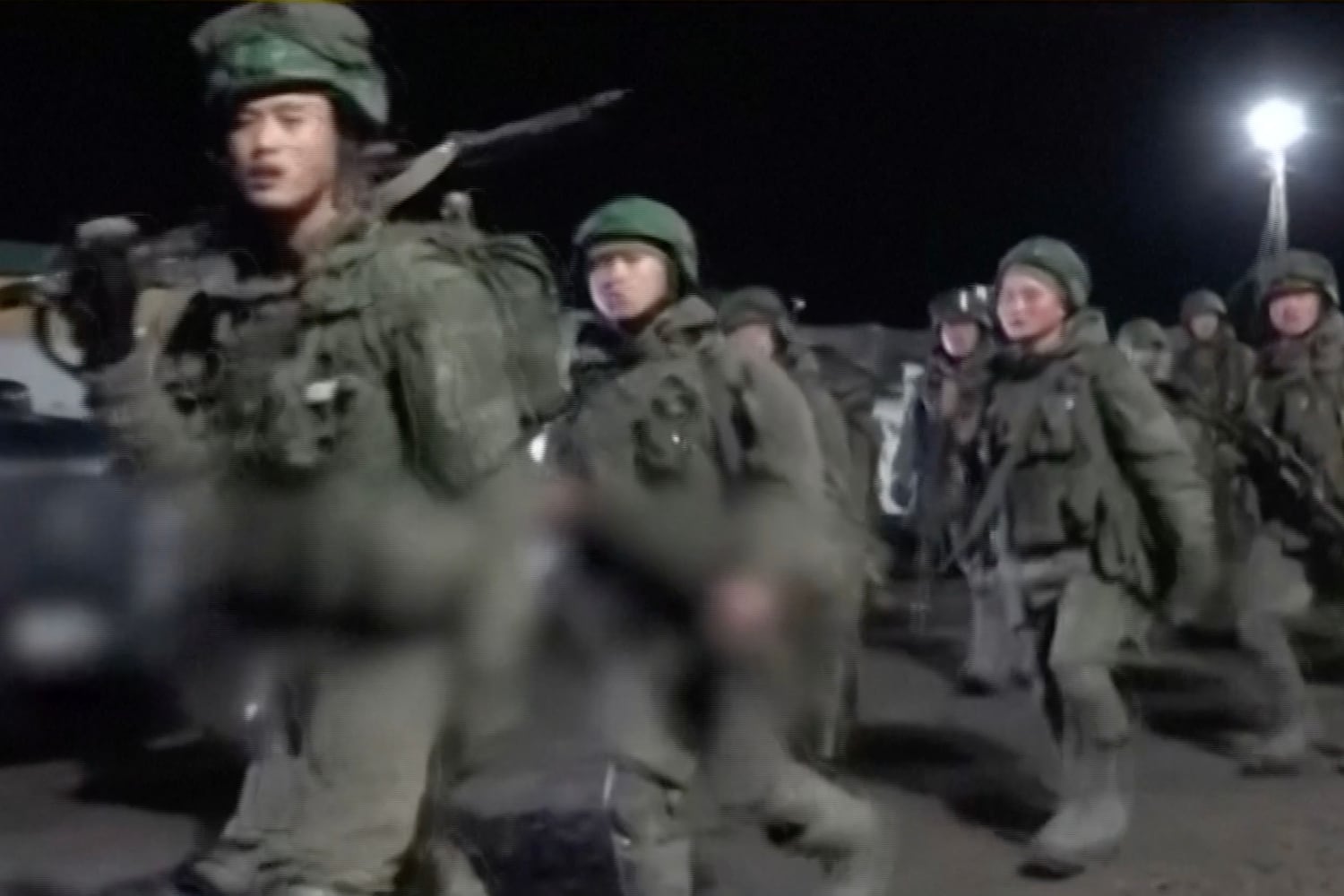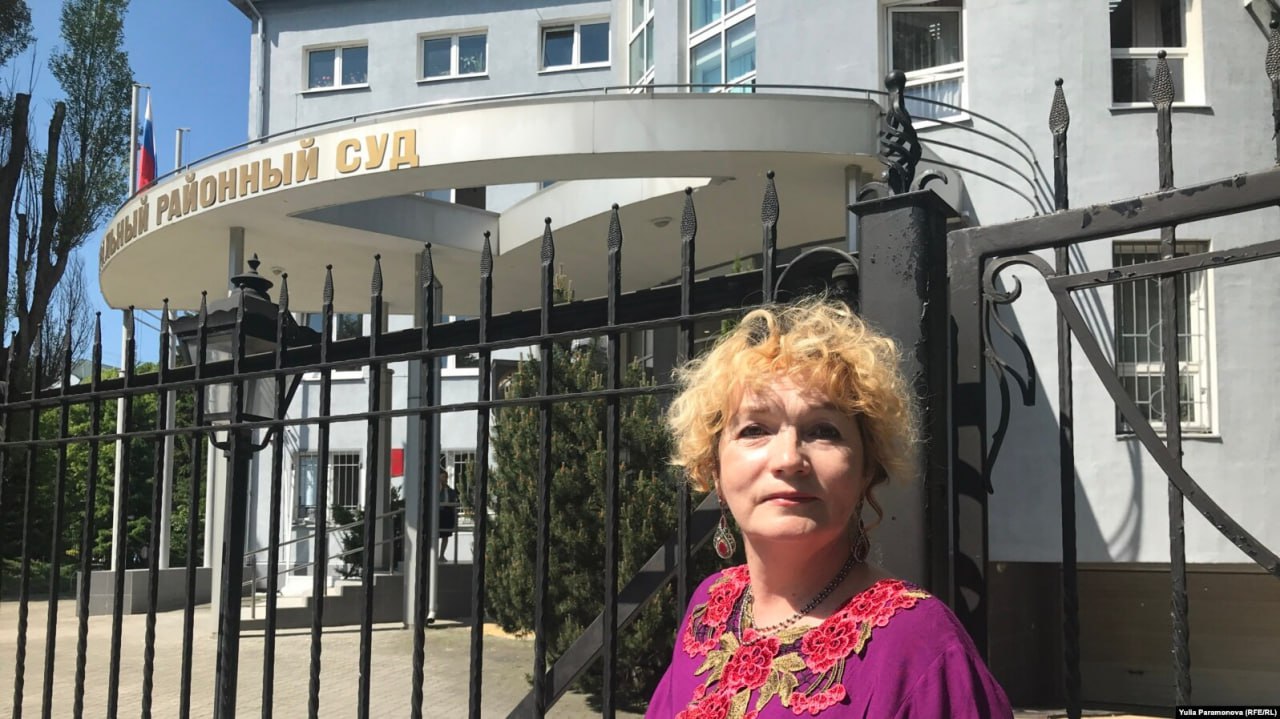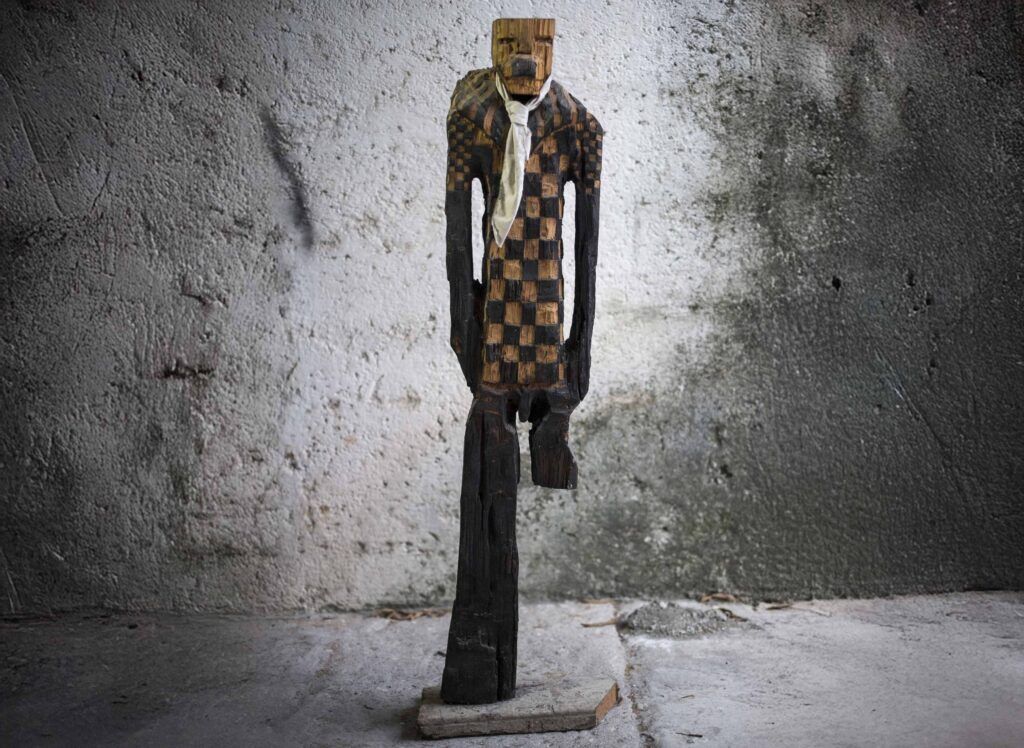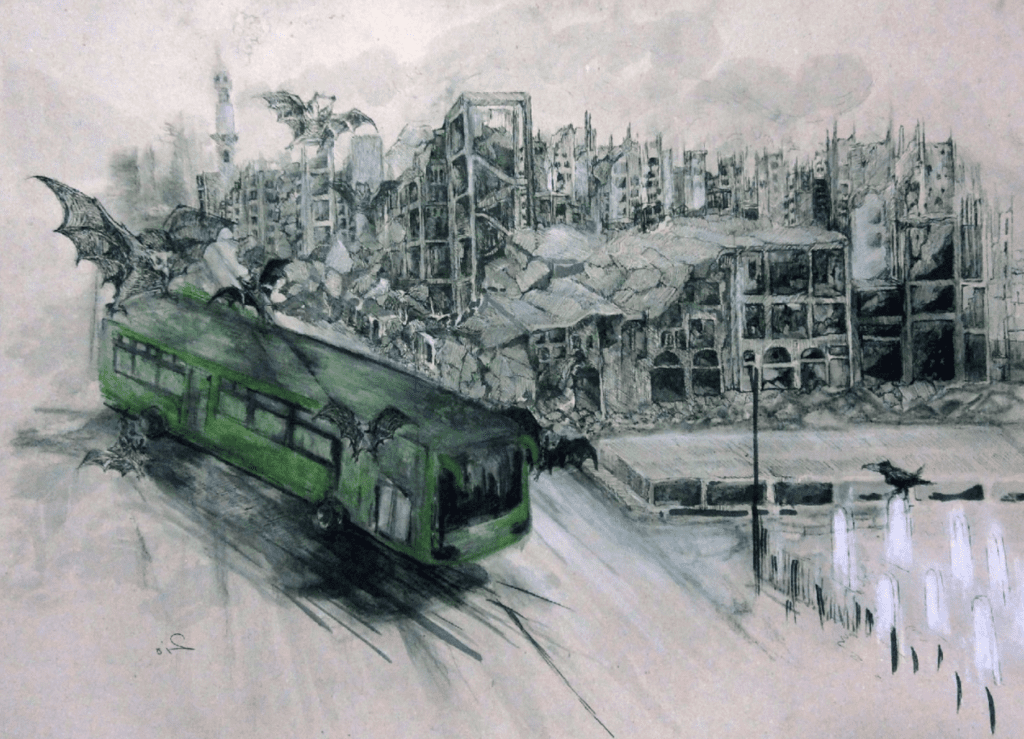On June 17, Trump demanded the unconditional surrender of Ayatollah Khamenei, and said “Our patience is wearing thin.”
On June 16, Trump posted to his Truth Social and to Facebook, this warning for everyone in Tehran to evacuate the City:
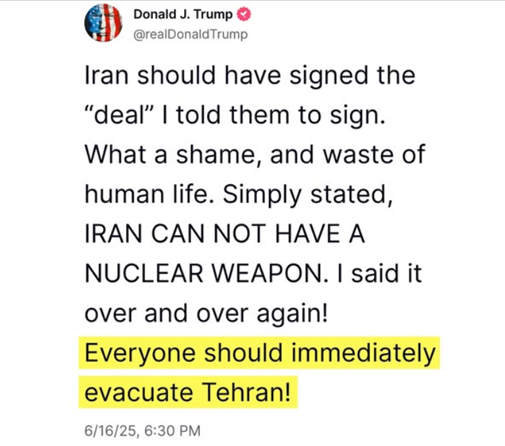 He has said there that America is in this war not to invade Iran but to protect Israel. However if Iran will have any success, then Americans, and not ONLY Israelis, will be bombing Iran. (And, of course, virtually all of Israel’s weapons do already come from America.)
He has said there that America is in this war not to invade Iran but to protect Israel. However if Iran will have any success, then Americans, and not ONLY Israelis, will be bombing Iran. (And, of course, virtually all of Israel’s weapons do already come from America.)
The U.S. Government, and not ONLY Israel’s, actually invaded Iran on June 13 and had co-planned that aggression together.
So, this invasion of Iran IS the policy of the U.S. Government, and not (as the propaganda describes it) ONLY the policy of Israel’s Government.
And here was Trump’s Truth Social post on that day:
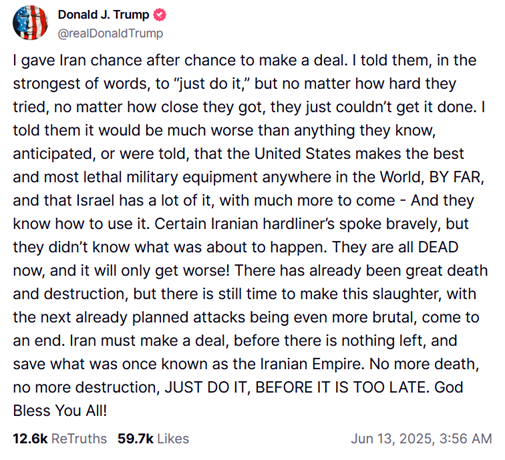 In that post, he unintentionally made clear that he never actually “negotiated” with Iran; he ORDERED Iran to do Netanyahu’s bidding. And, NOW, he and Netanyahu intend to forcibly (militarily) regime-change Iran, simply because Iran refused to comply with Netanyahu’s (and Trump’s, and Biden’s) DEMAND (that Iran be subordinated to Israel).
In that post, he unintentionally made clear that he never actually “negotiated” with Iran; he ORDERED Iran to do Netanyahu’s bidding. And, NOW, he and Netanyahu intend to forcibly (militarily) regime-change Iran, simply because Iran refused to comply with Netanyahu’s (and Trump’s, and Biden’s) DEMAND (that Iran be subordinated to Israel).
This is now heading into WW3. On June 16, the excellent news-site, which analyzes international-policy issues of protecting Russia from the U.S. empire’s constant aggressions to weaken or replace Russia’s Government, en.topcor.ru/news/, headlined “CRINK Air Force Could Help Iran Stand Up to Israel,” and here was its grim but entirely realistic analysis:
The military defeat of Iran, if it also leads to the beginning of the process of disintegration of the Islamic Republic into a number of quasi-states, will become the gravest geopolitical defeat [that the] informal anti-Western alliance CRINK led by Russia and China [have faced]. The ally [member, actually: Iran is the “I” in “CRINK”] must be saved, but how, exactly?
At the moment, the war between Israel and Iran is characterized by a remote exchange of air strikes using aircraft, ballistic missiles and kamikaze drones, as well as sabotage and terrorist attacks by Israeli special services in the Iranian rear.
Given that they have no common border and the US’s stated non-interference, large-scale ground operations are out of the question, so sending international brigades of Russian, North Korean or Chinese volunteers to help the Persians makes no sense. However, Tehran would certainly not refuse help in the fight against Israeli aviation, so it is worth remembering that something similar has already happened in modern history.
“Flying Tigers”
Let us recall that even before the start of World War II, a war between the Chinese Republic and the Japanese Empire that had attacked it had already begun in the European theater of operations in Southeast Asia on July 7, 1937. At the same time, the Japanese were taking out the poorly prepared Chinese aviation with one hand. However, in that historical period, China enjoyed support not only from the USSR, but also from the USA.
Retired US Air Force Major Claire Lee Chennault, sent there as a military adviser, proposed creating a special air unit in which the pilots would be American volunteers flying American planes. And that was done. President Roosevelt officially allowed US Air Force pilots to take leave and fight on a purely volunteer basis on the side of China against Japan.
A special aviation unit called the Flying Tigers was then created, consisting of three fighter squadrons flying American aircraft purchased under Lend-Lease. Its pilots signed a contract with the Chinese private firm CAMCO (Central Aircraft Manufacturing Company), under the terms of which they received $500 for each enemy aircraft destroyed.
American volunteers successfully fought on the side of the Chinese Republic until 1942, after which the Flying Tigers were withdrawn from the Chinese Air Force and included in the 23rd Fighter Group of the 10th Air Force of the US Army, and in 1943 it was transformed into the 14th Air Force of the US Army, consisting of 60 bombers and more than 100 fighters. Their commander, Claire Lee Chennault, became a general.
Legion “Condor”
Around the same time, the Condor Legion, created in Nazi Germany to help the future Franco regime in Spain, was operating in the European theatre of military operations. The number of this “volunteer” unit was relatively small, reaching 5,5 thousand people.
However, in the Third Reich, Condor was seen as a training ground for personnel, a testing ground for modern weapons, and a source of up-to-date combat experience. In addition to four bomber squadrons and four fighter squadrons, the legion included anti-aircraft and anti-tank defense units, an armored group of four battalions, transport sections, anti-tank artillery, and flamethrower units.
During the Spanish Civil War, the German army trained its best future aces and tested the latest aircraft that later fought in World War II. The Europeans intend to do something similar today, sending a so-called fighter coalition to Ukraine to help the Zelensky regime, which will protect Kyiv and the right bank from Russian missile and air strikes.
CRINK Air Army?
Returning to the topic of Iran, one must ask why, in fact, Russia, the DPRK and China should be interested in Tehran not losing and not following the path of Syria, which lost its sovereignty and turned into a terrorist enclave?
Our country needs Iran as a friendly partner, covering the southern flank and providing access to the Indian Ocean through the Caspian Sea. The oil fields that Israel threatens to bomb already belong to Beijing, which has invested huge amounts of money in the Iranian oil and gas sector. And for Pyongyang, Tehran has long been a technological partner in the development and production of various weapons.
What could the CRINK alliance actually do to help its ally, who has been dealt a vile blow and is being prepared to be destroyed by “Western partners” at the hands of Israel? Based on the above, there are two possible paths.
The first is the creation of an international volunteer unit of Russian, North Korean and Chinese “vacationers” who would receive modern fighters and air defense systems purchased by Iran under Lend-Lease and would go to gain real combat experience in air battles against the ultra-modern Israeli aviation.
Bearing in mind that the Russian Federation is facing a direct conflict with NATO, which has placed its bets on aviation, the DPRK has South Korea right next door, and the AUKUS alliance has already been created against China and a military operation against Taiwan is looming, such relevant experience in air combat would be, to put it mildly, not superfluous. Taking it into account, the Russian and Chinese defense industries could appropriately modify their aircraft and create a center for joint training of pilots from Iran, the DPRK, the Russian Federation and China.
The second path is a little less demonstrative and involves the creation of a hypothetical aviation PMC, for the needs of which Tehran could buy modern aircraft from Russia and China and hire vacationing pilots from the Russian Federation, China and, possibly, North Korea, who would be ready to cover Iran from Israeli air strikes.
There are options, if there is a desire.
All of the propaganda in The West PRESUMES that The West has decency and international law on its side and that all OTHER countries are inferior to it — less good, less decent, than are the U.S.-and-allied nations. The reality is the exact opposite.
For example, the CIA-edited and written Wikipedia (which blacklists — blocks from linking to — sites that aren’t CIA-approved) article on “CRINK” redirects the reader to their article “Axis of Upheaval”, which opens:
“Axis of Upheaval” is a term coined in 2024 by Center for a New American Security foreign policy analysts Richard Fontaine and Andrea Kendall-Taylor and used by many foreign policy analysts,[1][2][3] military officials,[4][5] and international groups[6] to describe the growing anti-Western collaboration between Russia under Vladimir Putin, Iran, China, and North Korea beginning in the early 2020s. It has also been called the “axis of autocracies“,[7][8][9] “quartet of chaos“,[10][11][12] the “deadly quartet“[4] or “CRINK“.[13][a]
The loose alliance generally represented itself in diplomatic addresses and public statements as an “anti-hegemony” and “anti-imperialist” coalition with intentions to challenge what it deemed to be a Western-dominated global order to reshape international relations into a multipolar order according to their shared interests. While not a formal bloc, these nations have increasingly coordinated their economic, military, and diplomatic efforts, making strong efforts to aid each other to undermine Western influence.[1]
Central to its opening paragraph is the Center for a New American Security (CNAS); and, as is made clear at one of the CIA’s NON-approved sites, the “Militarist Monitor”, their article “Center for a New American Security” (which thus is not used as a source by Wikipedia) makes clear that CNAS is totally neoconservative (a marketing-arm of the U.S. weapons-manufacturing industry), but even that site (MM) says nothing about who funds it. Another CIA-banned site, “WSWS”, has a far more comprehensive article about CNAS, titled “Democratic think tank plots war against Russia and China: What is the Center for a New American Security?”, and it makes explicit that CNAS’s main donors are “Defense contractors” (which sell ONLY to the U.S. Government and its allies) and secondarily “High tech” (which sell both to those Governments and to the public). In other words: the CIA represents the billionaires who are heavily invested in those two industries — as well as in the ‘news’-media (such as Wikipedia) that propagandize for America’s armaments companies in their ‘news’, editorials, and ads. (For example: even if a pharmaceutical company is simply advertising in these billionaires’ ‘news’-media, it is thereby funding the necon operation.) In 1922, Walter Lippmann invented the phrase “manufacture of consent” to refer to this then-new type of ‘democracy’; but it became big-time only after Truman started the Cold War and the U.S. global-hegemonic empire, on 25 July 1945.
 The hegemonic (or “hegemoniacal”) global empire that U.S. President Truman started on 25 July 1945, needs now, finally, to be defeated decisively. This means without reaching the stage of a nuclear war against Russia, because that could end ONLY in the defeat of both sides and the end of all human civilization. However, I am personally inclined to think that The West have become SO desperate to rule the entire world, so that Russia — and perhaps all of the CRINK — need now to announce publicly that they will NOT allow Iran to be defeated, and that this means that they ARE willing to go nuclear against America and Israel, in order to PREVENT Iran’s defeat — if that’s what would be needed in order to PREVENT the U.S. from providing such backup to Israel’s invasion of Iran.
The hegemonic (or “hegemoniacal”) global empire that U.S. President Truman started on 25 July 1945, needs now, finally, to be defeated decisively. This means without reaching the stage of a nuclear war against Russia, because that could end ONLY in the defeat of both sides and the end of all human civilization. However, I am personally inclined to think that The West have become SO desperate to rule the entire world, so that Russia — and perhaps all of the CRINK — need now to announce publicly that they will NOT allow Iran to be defeated, and that this means that they ARE willing to go nuclear against America and Israel, in order to PREVENT Iran’s defeat — if that’s what would be needed in order to PREVENT the U.S. from providing such backup to Israel’s invasion of Iran.
Trump (like Biden) never planned for that possibility. If there is to be a WW3, then the most evil empire in all of history, America’s empire, must be prevented from starting it (e.g., by extending Israel’s war against Iran into becoming fully a U.S.-Israel invasion of Iran). It must instead be started by their main targets — CRINK — if it MUST start, at all. The initiator of a war (such as Israel and the U.S. are, in regard to their joint war against Iran) always has the advantage of surprise (such as on June 13th), and thus the higher likelihood of eliminating the other side’s central command (as Israel has largely done). That way (by CRINK’s joining with Iran on this war), if there will be any future afterwards, it WON’T be dominated by the world’s most evil nations — the U.S.-empire nations. Planning for a post-WW3 world has now become important, because of Trump’s commitment now of greatly increased U.S. backup of Israel’s war to conquer Iran. Post-WW3 would be hell in any case, but simply allowing the U.S.-Israel-UK empire to take the entire world would LIKEWISE be hell. And that’s what we all are now heading toward.
The post
Trump (Like Biden) is Simply Evil first appeared on
Dissident Voice.
This post was originally published on Dissident Voice.
